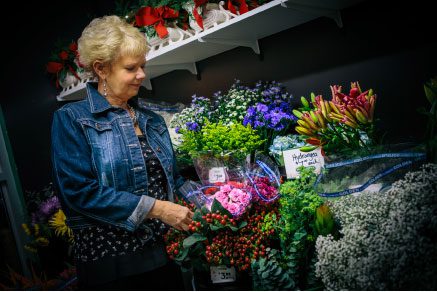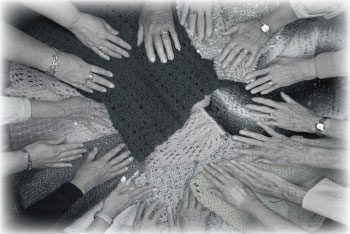 “Caregiving begins with God,” says Walter Wiens, pastor of care and administration at Clearbrook MB Church, Abbotsford, B.C. “I need to ask, ‘What is Jesus up to? How can I be involved in his ministry?’”
“Caregiving begins with God,” says Walter Wiens, pastor of care and administration at Clearbrook MB Church, Abbotsford, B.C. “I need to ask, ‘What is Jesus up to? How can I be involved in his ministry?’”
Whether their community members are adjusting to the challenges of birth or aging, recovering from lifesaving surgery or saying their final goodbyes, MB churches of all sizes and regions are practising the “one-anothers” of Scripture with prayerful compassion.
Serving one another
Of Clearbrook MB’s 350 members and adherents, some 98 are convalescing or in care. Wiens and his wife Edith visit six to ten people a week, but they can’t do it alone; when new people join the church, Wiens assigns them to the care of one of 17 visitation group leaders.
Retired pastor Irma Barkman from Saskatchewan says that “everyone in the church is a minister.
 “How many ‘one another’ commands are there? ‘Care for one another, pray for one another, be kind to one another’ (Ephesians 4:32; 1 John 4:7) – and they aren’t optional.”
“How many ‘one another’ commands are there? ‘Care for one another, pray for one another, be kind to one another’ (Ephesians 4:32; 1 John 4:7) – and they aren’t optional.”
Someone who’s been through the same experience, such as a miscarriage or loss of a parent, can “comfort those in any trouble with the comfort [they themselves] receive from God” (2 Corinthians 1:4). Barkman’s home church, West Portal MB, Saskatoon, facilitates groups focused on needs such as Grief Share, divorce care, depression, self-image, and parenting issues. With the help of a leader, says Barkman, participants share stories and “gain strength from each other.”
Willingdon, a church of 4,000 in Burnaby, B.C., uses members’ gifts – whether giving manicures or leading Bible studies – to build relationships in hospitals and care homes. “One lady loves music, so she got a group and went to seniors’ homes and did a worship service,” says Walter Patterson, pastor of visitation, pastoral counselling and practical care. “She led some to the Lord.”
“We want to move away from a pastor-centred church to a Christ-centred community where we care for one another as part of our life in the Spirit,” says L’Intersection pastor David Miller. He says relational struggles are the biggest challenge in the church and surrounding Terrebonne, Que., community: “Ongoing commitment in marriages is seen as difficult to sustain.” By praying and sharing openly, L’Intersection’s weekly home groups restore relationships and grow new believers.
 Fairview MB Church in St. Catharines, Ont., cares for its 200 members – 65 percent of whom are seniors – through encouragement cards, telephone ministry, transportation and visitation. Ministry coordinator Kenn Kraeker says Fairview attenders not active in a care group are still matched with a care group as “caring partners” who may be called upon to make meals for a member, and in turn, are cared for by the group in times of need.
Fairview MB Church in St. Catharines, Ont., cares for its 200 members – 65 percent of whom are seniors – through encouragement cards, telephone ministry, transportation and visitation. Ministry coordinator Kenn Kraeker says Fairview attenders not active in a care group are still matched with a care group as “caring partners” who may be called upon to make meals for a member, and in turn, are cared for by the group in times of need.
“Seniors, especially in the Western world, often have little sense of worth and security,” says Wiens. “We need to say to every senior: it’s good that you are in this world! Then we need to demonstrate this by our actions.” He tries to “replace a feeling of guilt that we need to do more for our seniors with an enthusiasm to minister with them.” Clearbrook MB’s annual Love Abbotsford outreach includes 50 people – most of them seniors – baking cookies to distribute.
Delores Derksen, director of care at Forest Grove, Saskatoon, encourages seniors to be faithful prayer warriors. “They say, ‘I don’t have a lot to give.’ I say, ‘Can you pray?’” All 120 Fairview seniors who attend monthly Prime Time programs become Age-to-Age prayer partners: each is paired with a youth member or young family for prayer.
Speaking encouragement
“The most important thing in a crisis is our presence, best received through quietness and listening,” says Wiens. Willingdon’s Patterson agrees: “We look for good listeners with passionate kindness.”
Willingdon volunteer Reg Molnar asks those he visits about their interests, families and situations because “if they don’t know how much I care, they don’t care how much I know.” The least helpful thing to say is “anything that minimizes their deep concerns or places blame on them for their problem.” He reminds people of God’s love, Jesus’ victory over death and the celebration of eternity.
When visiting someone who’s ill, “one of biggest mistakes is ‘too positive’ thinking,” says Patterson; for example, saying things like “I know God’s going to heal you.” And don’t promise to come again unless you will.
Patterson says avoid discouraging comments from your own life like “My dad had the same thing, and he passed away.” He cautions against asking if the person committed any sins, making the mistake of Job’s friends (Job 4:7). If they ask, “Why is this happening to me?” it’s okay to say, “I don’t know.’”
“We depend on the Holy Spirit to give us nudges,” says Barkman. “We want answers quickly, but ‘God [is] making the necessary arrangements in response to what [we] asked’” (1 Samuel 1:19 The Message).
Prayer plays a large role, both before (to be a blessing) and during the visit (for specific needs). Through Molnar’s monthly prayer meetings with a man in his 50s who had a stroke, “God has worked his love into [the man’s] marriage, his attitudes, and his prayer life.”
“Prayer cannot be simply an ‘add-on’ that signals the visit is finished,” says Wiens. “In prayer, I seek to bring together all I sense God is doing in a person’s life.”
Visiting with sensitivity

Delores Derksen cares for others by delivering floral arrangements.
Photo: Ellaina Brown
While the fruits of the Spirit are the primary requirement, some training and practice can be helpful to get caregivers comfortable with the role. Barkman had caregivers role-play to build confidence. Wiens trains Clearbrook’s volunteers to keep confidentiality, deal with criticism, relate with medical staff, understand dementia and think Christianly about suicide.
Patterson trains Willingdon’s volunteers regarding appropriate touching: it’s okay lay a hand on a shoulder, but don’t touch a patient’s legs, and don’t grab their hand unless they reach for yours. He reminds them to wash their hands before and after each visit to avoid spreading germs.
The best time to visit a hospital or care home is late morning or early afternoon, says Patterson, because many residents go to bed early. When Fairview volunteers visit seniors in their apartments, some stay for tea for an hour or two, but if the senior is tired, the volunteer may stay only 10 minutes.
Before a surgery, Forest Grove’s Derksen prays with the patient over the phone, and she sits with the spouse during the surgery. She recommends waiting till the day after the surgery to call the family and ask when to visit again. A post-surgery visit should be quick: pray and leave.
“Dropping-in has fallen by the wayside with my generation working,” says Derksen. Now it requires intention and coordination. “If I hear of someone in need, I’ll ask some friends to make a meal.” It’s important to be aware of special diets. When you drop off the meal, Barkman says it’s okay to offer to do the dishes if you have a relationship, but “we encourage caregivers not to do too much” to prevent dependence.
Bearing gifts
 A Forest Grove volunteer visits a flower shop every two weeks for day-olds and turns them into arrangements for seniors who are shut-in. Derksen takes some to the grocery store parking lot; “I find a mom who’s struggling and say, ‘Here’s some flowers.’”
A Forest Grove volunteer visits a flower shop every two weeks for day-olds and turns them into arrangements for seniors who are shut-in. Derksen takes some to the grocery store parking lot; “I find a mom who’s struggling and say, ‘Here’s some flowers.’”
Derksen always brings a card with a Scripture verse and hymn on visits, particularly for those with dementia. “If I leave the card, they know I’ve been there…and the spouse knows – and it means more to them than anything.”
Dollar-store toys or colouring books can brighten a sick child’s day. Those who enjoy reading may appreciate receiving a devotional.
Prayer shawls are tangible and comforting for people in crisis “who like to hang onto something,” says Erna Dick. A palliative care volunteer for 20 years, Dick was inspired by a bereavement conference speaker’s endorsement of the comfort value of teddy bears or memory boxes. She organized Fairview’s knitters and crocheters to make the shawls, which are given out with a card that reads: “As it was created, we prayed for you! We asked the Lord to give you blessings of courage, strength and peace.”
Between June and November 2013, Fairview delivered 45 shawls across Ontario and into Manitoba. A woman whose fiancé was taken off life support after an accident “wore her prayer shawl all day and told everyone ‘someone is praying for me,’” says Dick. Dick’s daughter in Owen Sound requested a shawl for a girl undergoing facial reconstructive surgery. At Fairview’s Time Out knitting lesson, a woman asked, “My mom has cancer; can I have a shawl for her?”
Twice a year, the prayer shawl committee at Forest Grove visits a care home, performs a short program, and distributes 30 or 40 homemade shawls. “We pray a blessing over each person as we give it to them,” says Derksen.
 Grieving together
Grieving together
“Many people don’t walk with a family through a loved one’s last days; they run through the grief valley and dash into the sunshine!” says Wiens. “With David, we need to feel God’s comfort in the valley of the shadow of death. Only as we slow down can the person feel God’s care through us. Too often I’ve observed how caregivers, myself included, give quick Bible promises without grieving with the family. Are we not convinced that God is enough for the painful times?”
After a husband’s funeral, Derksen takes a widow for coffee first weekly, then monthly, and keeps in touch years later. “I try to do something special,” she says. “One lady’s husband used to bring her roses every month, so I bring her roses now.”
Young mothers who have lost their husbands find it difficult to attend Grief Share, so Willingdon started Naomi Circle where the men’s group cares for the children while the women have their own class.
There are stages to grief, and everyone goes through them differently, says Barkman. Don’t say, “You’ll get over it; time will heal; aren’t you thankful he or she was a Christian; they’re in heaven, so everything is fine.” Talk about the person who is gone: the hardest things, the happy things, she says. “‘Tell me about…’ are the most powerful words to give someone who’s grieving.”
At Christmastime, Barkman led a remembrance service for those who had lost someone. They put the name of each loved one on the Christmas tree. It’s a way of saying, “I want you to celebrate with me that this person was important to me,” says Barkman. “One woman had lost three babies; for her, it was a closure ceremony.”
Releasing burdens
 For caregivers, burnout is a real concern. “These burdens are so heavy,” Barkman told fellow pastor Kelly Wiebe. “I’m hearing so many sad stories.” Wiebe taught her to raise her hands and say, “God, take this; I can’t carry it.” Now, when a person Barkman cares for asks, “Remember when I said…?” she says, “I gave that to God; you’ll have to refresh my memory.”
For caregivers, burnout is a real concern. “These burdens are so heavy,” Barkman told fellow pastor Kelly Wiebe. “I’m hearing so many sad stories.” Wiebe taught her to raise her hands and say, “God, take this; I can’t carry it.” Now, when a person Barkman cares for asks, “Remember when I said…?” she says, “I gave that to God; you’ll have to refresh my memory.”
“If we are not prepared to look in the mirror and realize we will all need care,” says Wiens, “then we cannot provide genuine care when [another] grows weak.” But if we take it on as a personal burden, “then I will never do all that’s necessary,” says Wiens. Caregivers must seek God’s strength: “Jesus will never require me to do more than he will enable me to do.”
“It’s an honour to sit with someone in their last hours on earth before they meet their Lord they love so much,” says Derksen. “So many look toward the corner, and I’ll say, ‘Do you see Jesus?’ and they say ‘Yes.’”
“Joy is when you meet believers in Christ who have a tremendous hope,” says Patterson. “Many times, I’ve left a hospital rooms or care homes thinking, ‘These people blessed me to keep going in my faith.’”
“It’s so rich when we involve ourselves in each other’s stories,” says Barkman. “If each of us cared deeply about a couple people, what difference could God make in our church and our neighbourhood?”
—Angeline Schellenberg

Fairview’s prayer shawls and caring hands.
Photo: Courtesy Fairview
Resources to help you care:
Caringbridge.org: an online journal and guestbook for health crises
takethemameal.com: for scheduling food sharing
StephenMinistries.org: training for lay caregivers
www.telecarebc.com: Christian crisis line
Griefshare.org: recovery group material
